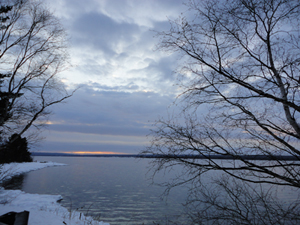Climate
Climate Change and the Great Lakes
When you hear the words climate change or global warming you probably think of polar bears, melting glaciers and rising ocean levels -- things that are distant in the context of our lives here in the Upper Peninsula and may lead people to believe that our region will not be impacted by climate change. As scientists continue to model the impacts of climate change and make predictions about what may happen in the future across the globe, it appears that no area will remain untouched.
So what exactly is climate change? First let's distinguish between weather and climate. 
Weather is the current conditions outside your window right now (raining, snowing, sunny, cloudy). Climate is the long-term pattern of weather for a particular area or region. When we talk about climate change, we're talking about a change (or shift) in the long-term pattern of weather conditions for a region (i.e. warmer, colder, wetter, drier). The issue is not necessarily that climates are changing (they've done this on cycles of warming and cooling since Earth's creation); the issue is that the changes are occurring at rates faster than the natural environment (and some human populations) can keep up with. The reasons for the rate increase are up for debate. However, it is widely accepted that human activities (i.e. driving vehicles, burning fossil fuels) that increase emission of greenhouse gases (i.e. methane, carbon dioxide) are one main reason for the increase (the Green House Effect).
Some of the predicted changes for our area based on scientific models (current and/or future) include:
- More mild winters
- Hotter, drier summers
- More rain, less snow (especially during winter months)
- More frequent and intense rain events
- Longer growing season
- Change in migration timing and patterns of wildlife
- Ice on lakes will form later in the winter (if at all) and breakup earlier in the spring
- Change in abundance and distribution of coastal wetlands
- Loss of native plant species; increase in non-native species

What is KBIC doing to address climate change?
KBIC has identified planning for climate change as a priority in their Strategic Plan and the Natural Resources Department has hired staff to begin the processes of developing a climate change action plan for the Reservation. Other actions include passing a resolution for "green purchasing", and forming the Committee for Alternative and Renewable Energy (CARE) to explore options for renewable and sustainable energy on the reservation, which ultimately lead to a reduction in the emissions of greenhouse gases which contribute to climate change.
Many other tribal, state, and federal agencies are also working to address climate change within their organizations. For more information about how Tribes are addressing climate change throughout the U.S., visit the climate change page for the Institute for Tribal Environmental Professionals.
For more information about how Tribes are addressing climate change in Michigan and the Great Lakes region, see the Michigan Tribal Climate Change Vulnerability Assessment and Adaptation Planning (ITCMI 2016) and the Tribal Climate Adaptation Menu (GLIFWC 2019).
Additional Links:
U.S. EPA site on climate change
National Fish, Wildlife & Plants Climate Change Adaptation Strategy
Wisconsin Initiative on Climate Change Impacts (WICCI)
National Oceanic and Atmospheric Administration (NOAA) Climate Watch
Climate Justice, Sustainability, and Sovereignty bibliography (KP Whyte)
